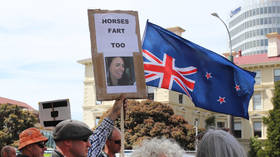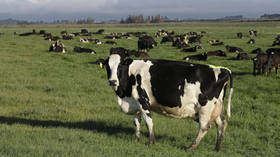Farmers protest ‘cow fart tax’

New Zealand farmers took to the streets across the country in their tractors on Thursday to denounce Prime Minister Jacinda Ardern’s scheme to tax “agricultural emissions,” including cow farts and burps. They argued that not only would the added costs put them out of business, they would increase - not reduce - greenhouse gas emissions.
Farmers’ advocacy group Groundswell New Zealand organized the protests in over 50 towns and cities, some filling the streets with dozens of tractors. “Several hundred to a few thousand people” were predicted to join in, though media reports claimed turnout was underwhelming.
Farmers at the protest argued the tax would not only drive them out of business but ultimately increase emissions by forcing farmers in other countries with less efficient practices to take up the slack. They pointed out that the tax does not take into account the trees and bushes farmers plant on their land, which take carbon out of the atmosphere. Some said they would refuse to pay it.
The new regulation, which has yet to obtain final approval, would tax farmers based on the estimated methane and nitrous oxide gas generated by their livestock herds starting in 2025. Payments would come due every one to three years, and every farmer who reached a certain threshold for herd size and fertilizer use would be affected. The government has argued farmers could recoup the money by charging more for environmentally-friendly products, though with a recession menacing most of the world’s developed economies, it’s not clear who will be able to afford them.
Farming is a massive industry in New Zealand, where there are twice as many cattle as people and five times as many sheep, and dairy is the country’s chief export. Accordingly, the industry makes up about half of its greenhouse gas emissions, and much of that is the methane that comes from burping cows. That hasn’t stopped critics of the legislation from dubbing it the “cow fart tax,” a popular misconception stemming from the unfortunate wording of US congresswoman Alexandria Ocasio-Cortez’s 2019 “Green New Deal” bill.
The agricultural emissions tax would be the first of its kind in the world. As part of Ardern’s pledge to make New Zealand carbon neutral by 2050 in order to tackle climate change, the government hopes to reduce methane emissions from livestock by 10% by 2030 and by as much as 47% by 2050. A similar initiative in 2003 was stymied by massive protests from the industry.














